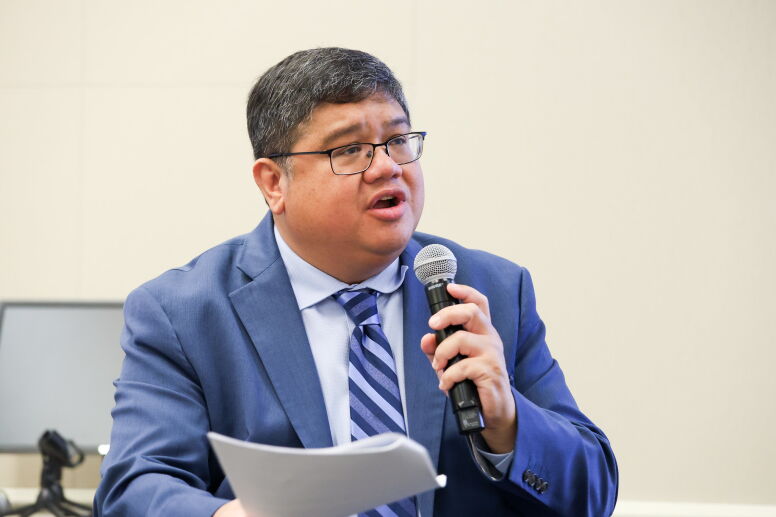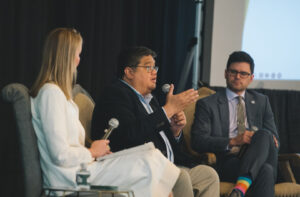News & Stories
Reframing the issue of affordable housing

Eric Maribojoc has been in real estate long enough to see many angles of the housing puzzle: the politics, the economics, the policy ambitions that don’t quite land.
At UNC Kenan-Flagler Business School, he’s helping to shape the next generation of industry leaders. Not just to build, but to build better.
The finance professor’s remit is straightforward, even if the challenge is not: expand the Wood Center for Real Estate Studies’ housing affordability initiative, create new opportunities for students to work directly on developing and financing affordable and workforce housing, while harnessing UNC Kenan-Flagler’s longstanding commercial real estate clout to influence the conversation — and action — on a nationwide housing crisis.
“There are not many business schools that include affordable housing as part of their curriculum,” Maribojoc says. “It’s a really strong indication of the commitment of the School and the real estate program — to both teach how to do well and how to do good.”
The phrase “affordable housing” is well-worn. While the issue has drawn consistent attention, turning that concern into solutions at scale has proved stubbornly difficult. What UNC Kenan-Flagler aims to do — and what drew Maribojoc to the Wood Center — is to reframe the issue also as a business problem, focusing on what’s not working and how it can be fixed.
“Approaching it from a business perspective is a strong part of the solution,” he says. “The problem has gotten so large and systemic that purely public approaches — while they should be part of the solution — will not be enough. A lot of the solution lies with the industry and the private sector. And the work of people like our students.”
That work is grounded in economics, not just ideology. “The only way we can find solutions that are sustainable, can be delivered at scale and funded at scale is for the private sector to work on ways to make housing less costly.”
One of the clearest examples of that belief is the new affordable housing fellowship. In 2024, the Wood Center launched the pilot program, which supports rising UNC seniors interning with nonprofit housing developers across North Carolina.
“The fellowship is meant to expose students to nonprofit organizations that do a great job developing affordable housing — but might not have the resources to hire interns from UNC for the summer,” says Maribojoc. “We fund the opportunity to have this amazing experience as part of the students’ learning process and help these organizations with their work. The students take those lessons with them back into the classroom and out in the real world after graduation.”
Three students were placed in the inaugural cohort. Maribojoc hopes that number will grow.
“If this is successful, we hope to expand it with more positions throughout North Carolina and other states. We’re hopeful this is the start of a wider opportunity for our students.”
UNC Kenan-Flagler has one of the more mature real estate education programs among U.S. business schools, with a deep alumni base in development, investment and finance. The question is how to leverage that pipeline for a cause that often sits outside conventional capital markets.
“It’s one of the things that drew me here,” says Maribojoc. “Harnessing that talent pipeline for affordable housing development is a great thing. We’re focusing on what we already do well and trying to focus those skills into an important issue of our day.”
The aim is not to turn every graduate into a housing developer or policy advocate. But exposure matters, Maribojoc says, and so does empathy.

“The hope is that wherever our students end up in commercial real estate, they’ll have an appreciation for how housing needs influence what they do. Hopefully some will go into affordable housing as a career choice, as some already have.”
Much of Maribojoc’s career has been spent navigating the space between public and private interests, shaped by his time in real estate investment funds before moving into academia and public sector work. He doesn’t romanticize either side.
“It definitely is a public-private endeavor to solve the issue. Housing is an industry the public sector plays a heavy role in — not only in production, but also in regulation and policy,” he says.
Private developers, meanwhile, need to think in longer and wider arcs.
“That’s what the public sector can inform the private developers about,” Maribojoc adds. “Trying to strike the right balance is important. But both need to have this shared goal: How do we produce housing in a less costly manner and for more people?”
Asked what headline he’d like to read a year from now, Maribojoc doesn’t hesitate: “That there are more choices of housing available for people with a wider range of incomes. Whether that’s because we built more housing or built housing that’s more affordable. And there’s less regulation that will allow housing to be built faster.”
But he’s not just thinking in terms of unit counts and permits. UNC Kenan-Flagler, he believes, has a broader role to play.
“A university has this traditional role of being a forum for research and discussion about the issues of the day. So, the Wood Center is trying to play that role: hosting conferences, research symposiums, encouraging more faculty to focus on affordable housing,” he says.
For now, his focus is on the basics: giving students a clearer view of the problem and the tools to do something about it.